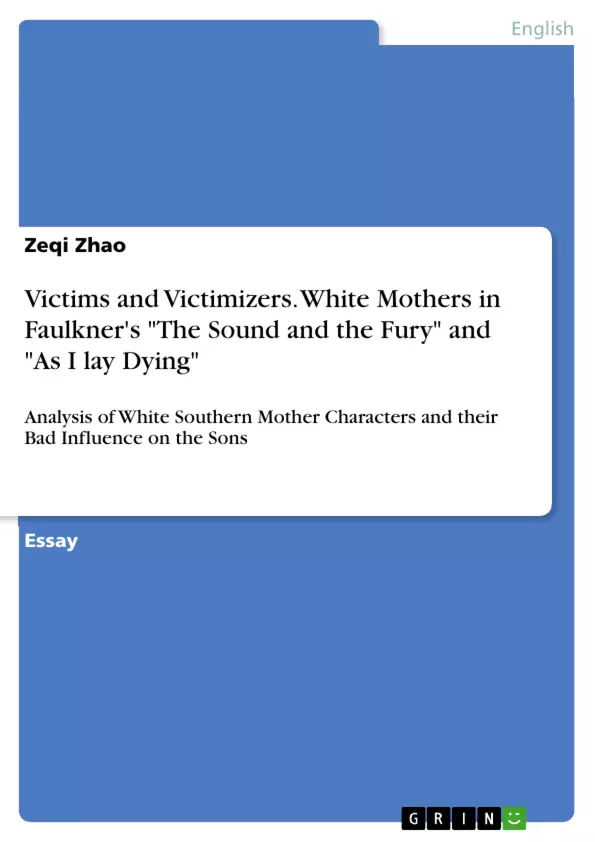Faulkner has a continuing concern with relationships of son and mother. The mothers seem to always stand in the central position of the family and have a big influence on the destiny of the whole family. In this paper, I will discuss the white southern mothers’ role in the society and the family using Faulkner’s two most representative works as examples, namely “The Sound and the Fury” and “As I Lay Dying”: On the one hand, they are the evil force that traumatizes their sons and leads to the degeneration of the whole family; On the other hand, they are also the victims of the patriarchal society. They are victims and victimizers.
In order to find the connection between the mothers’ bad influence and the dysfunction of their sons, I will also analyze the sons’ psychological response because the loss of the maternal love. These victims, mothers and sons, can help us take a look at the change and decline of the old South from social and psychological perspectives.
Inhaltsverzeichnis (Table of Contents)
- Abstract
- Introduction
- White Mothers: Victims and Victimizers
- White Southern Mothers
- Mrs. Compson
- Addie Bundren
- Southern Society
- Faulkner's View of Women
- Conclusion
Zielsetzung und Themenschwerpunkte (Objectives and Key Themes)
This paper examines the role of white southern mothers in Faulkner's works, focusing on their influence on their sons and the broader implications for the decline of the old South. It analyzes how these mothers, often presented as "evil" forces, are also victims of the patriarchal society.
- The complex and often destructive relationship between mothers and sons in Faulkner's works
- The impact of the patriarchal society on the lives and identities of white southern women
- The psychological effects of maternal neglect and abuse on sons
- The connection between the dysfunction of families and the broader societal changes in the old South
- The role of women in the perpetuation of white supremacy and the myth of the "southern life-style"
Zusammenfassung der Kapitel (Chapter Summaries)
The introduction presents Faulkner's recurring theme of the son-mother relationship, highlighting the significant role of mothers in shaping the destinies of families. It introduces the key characters and works under analysis, namely Mrs. Compson from "The Sound and the Fury" and Addie Bundren from "As I Lay Dying," both presented as figures who significantly impact their sons' lives. The analysis then examines the social context of these women's roles within the patriarchal structure of the old South, highlighting the double-edged sword of their position as both victimizers and victims. This analysis delves into the harmful impact of the societal pressures placed on women, particularly regarding their chastity and virginity, which ultimately leads to their alienation and the inability to fully express their emotions and fulfill their roles as mothers. The paper concludes with a deeper exploration of Mrs. Compson's character, revealing how she became a victim of this "lady-making" process, ultimately failing to provide genuine love and care for her children. The paper argues that her coldness and selfishness stem from the societal constraints placed on her as a woman in the old South.
Schlüsselwörter (Keywords)
This paper examines the relationship between white southern mothers and their sons in Faulkner's works, particularly Mrs. Compson and Addie Bundren. It delves into themes of patriarchy, gender roles, maternal influence, psychological impact of maternal neglect, white supremacy, and the decline of the old South. The analysis focuses on the intersection of social and psychological factors in shaping the lives of both mothers and their sons, highlighting the detrimental effects of the patriarchal system on women and the broader implications for the social fabric of the old South.
Frequently Asked Questions
What is the central theme of Faulkner's "The Sound and the Fury" and "As I Lay Dying" regarding mothers?
The central theme is the complex relationship between white Southern mothers and their sons, portraying them as both "victims" of a patriarchal society and "victimizers" who traumatize their families.
How does Mrs. Compson influence her family in "The Sound and the Fury"?
Mrs. Compson is presented as a cold and selfish figure whose failure to provide genuine maternal love leads to the psychological dysfunction of her children and the decline of the Compson family.
In what way is Addie Bundren a victim of Southern society?
Addie Bundren is a victim of the patriarchal structures and societal pressures regarding a woman's role, which leads to her alienation and inability to express her emotions freely.
What are the psychological effects on the sons in these novels?
The loss of maternal love and the presence of destructive maternal influences lead to severe psychological trauma and contribute to the moral and social degeneration of the sons.
What does Faulkner's portrayal of mothers say about the "Old South"?
Faulkner uses these dysfunctional family dynamics to mirror the decline of the Old South, critiquing the myths of Southern lifestyle and the detrimental effects of its social fabric.
- Quote paper
- Zeqi Zhao (Author), 2015, Victims and Victimizers. White Mothers in Faulkner's "The Sound and the Fury" and "As I lay Dying", Munich, GRIN Verlag, https://www.grin.com/document/350583



